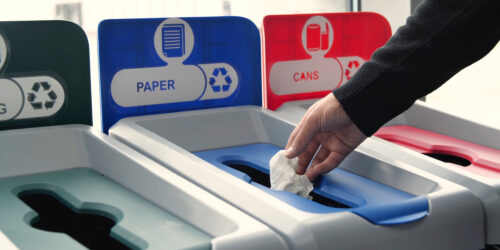Everything you need to know about recyclable materials
Recyclable materials play a crucial role in reducing waste and preserving natural resources. Their use not only reduces the environmental footprint but also leads to significant cost savings. For businesses, adopting effective recycling practices is a strategic way to meet environmental requirements while optimising costs.
What are recyclable materials?
Recyclable materials are substances that can be collected, processed, and reused after their initial use, instead of simply being discarded. This characteristic helps reduce the amount of waste and preserve natural resources, aligning perfectly with a circular economy approach.
The importance of recyclable materials in the circular economy is paramount. They allow:
- Reducing dependence on limited natural resources;
- Decreasing the amount of waste sent to landfills or incinerated;
- Saving energy in production processes;
- Reducing greenhouse gas emissions associated with the extraction and processing of raw materials.
Various types of recyclable materials
Certain materials are particularly well suited for recycling due to their unique properties and abundance.
Metals
Metals are among the most recyclable materials. Aluminium and steel can be recycled indefinitely without losing their properties. Aluminium, used for cans and food packaging, is particularly sought after for its recycling process, which consumes up to 95% less energy compared to primary production. Steel, on the other hand, is commonly recycled from old cars, household appliances, and building structures.
Plastics
Plastics pose a particular challenge due to the diversity of resins used. However, certain types of plastics, such as PET (polyethylene terephthalate) and HDPE (high-density polyethylene), are commonly recycled. Plastic bottles and rigid packaging are typical recyclable products. It is important to note that each type of plastic must be treated separately to avoid contamination, which sometimes complicates the recycling process.
Paper and cardboard
Paper and cardboard are among the most recycled materials in the world. The paper recycling process includes collection, sorting, de-inking, and transformation into new paper products. Cardboard, widely used for packaging, follows a similar process. Recycling paper and cardboard helps save trees and reduce water and energy consumption.
Glass
Glass is 100% recyclable and can be recycled indefinitely. Glass bottles, jars, and other glass containers can be recycled without quality degradation. The glass recycling process is relatively simple: The glass is collected, sorted by colour, cleaned, and melted to make new products. This process significantly contributes to waste reduction and the conservation of raw materials.
Other materials
In addition to metals, plastics, paper, and glass, other materials can also be recycled. Textiles, for example, can be transformed into new clothing or insulation materials. Wood, often used in construction, can be recycled into particle boards or compost. Electronic waste, although more complex to recycle, contains precious metals and components that can be recovered and reused.
Benefits of using recyclable materials for businesses
Integrating recyclable materials into the procurement and production processes of businesses offers many advantages, both economically and environmentally.
Reducing costs
The use of recyclable materials can lead to significant long-term cost savings:
- Decreased raw material expenses: Recycled materials are often cheaper than virgin materials;
- Reduced waste management costs: By recycling, businesses decrease the volume of waste to be disposed, which lowers associated fees;
- Energy savings: The recycling process generally requires less energy than production from virgin raw materials, resulting in savings on energy bills.
Adopting recycling and sustainable procurement practices allows businesses to reduce their impact on the environment while optimising their costs.
Improving brand image
The use of recyclable materials can help businesses strengthen their brand image:
- Positive consumer perception: Consumers are increasingly environmentally conscious and favour sustainable companies;
- Competitive differentiation: A recycling policy can become a unique selling point compared to the competition;
- Attraction of talent: Companies committed to sustainable development more easily attract young talents concerned about the environment.
Complying with environmental standards
Under the new regulations, businesses must segregate their waste before it’s collected for processing. This isn’t just about reducing waste; it’s about improving recycling efforts and sustainability across the board. Companies will need to separate dry recyclables, food waste, and general waste to ensure they are recycled properly.
Reducing the carbon footprint
The use of recyclable materials contributes significantly to the reduction of carbon emissions:
- Decrease in emissions related to the extraction and processing of raw materials;
- Reduction of transport emissions, as recycled materials are often available locally;
- Contribution to the company’s sustainable development
This approach allows businesses to minimise their carbon footprint while actively participating in environmental protection. As Marine Varret, Responsible for Sustainable Offer and Supply Chain at Manutan, explains: “We have been implementing a number of initiatives to reduce our environmental impact: Cutting our energy consumption, improving our waste management, developing digitisation and reducing the volume of printed catalogues, etc.”
To view our range of waste management products to support your recycling efforts visit our website or call our customer service team on 0800 652 6000.






